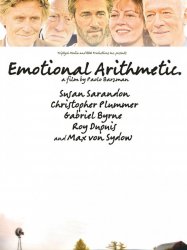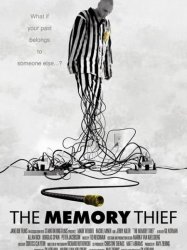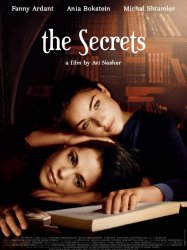Films with theme "Films about Jews and Judaism", sorted by revenue
 , 1h14
, 1h14Directed by Paul Mazursky
Origin USA
Genres Documentary
Themes Films about religion, Documentary films about religion, Films about Jews and Judaism
Actors Paul Mazursky
The documentary film follows filmmaker Mazursky as he goes to Ukraine for a festival for Hasidic Jews.

Young, Jewish, and Left (2006)
Origin USA
Themes Films about religion, Documentary films about religion, Films about Jews and Judaism
Young, Jewish, and Left combines queer culture, Jewish-Arab history, secular Yiddishkeit, anti-racist analysis, and religious traditions into a multi-layered picture of the circa 2006 Jewish Left. Personal experiences from many of the era's leading Jewish activists frame Jewish identity in what it the official website says is "a fresh and constructive take on race, spirituality, Zionism, queerness, resistance, justice, and liberation."

And Thou Shalt Love (2007)
, 29minutesOrigin Israel
Genres Drama
Themes Films about religion, Films about sexuality, LGBT-related films, Films about Jews and Judaism, LGBT-related films, LGBT-related films about religion, LGBT-related film
Ohad, the protagonist, is serving in the Israel Defense Forces as a Hesder student. He has not told anyone that he is gay. He tries various ways of dealing with the conflict between his religious beliefs and his sexual orientation, including Atzat Nefesh. He is told to spend forty days fasting and repenting to help rid him of his homosexual inclinations. He does this and believes himself to be cured.

Arranged (2007)
, 1h30Origin USA
Genres Drama, Thriller, Comedy, Action, Romance
Themes Films about religion, Films about Jews and Judaism, Films about Islam
Actors Zoe Lister-Jones, Daniel London, John Rothman, Marcia Jean Kurtz, Doris Belack, Arian Moayed
The film centers on two young women — one an Orthodox Jew, the other a devout Muslim — who meet and become friends as first-year teachers at a public school in Brooklyn. Over the course of the year they learn that they share much in common, not least of which is that they are both going through arranged marriages.

Beaufort (2007)
, 2h11Directed by Joseph Cedar
Origin Israel
Genres Drama, War, Historical
Themes Films set in Africa, Films about religion, Political films, Films about Jews and Judaism
Actors Alon Abutbul, Itay Tiran, Ohad Knoller, Oshri Cohen
Beaufort raconte les derniers jours du poste d'observation placé au sommet de la forteresse, avant l'évacuation du Liban par l'armée israélienne en 2000. Liraz Lebrati, l'officier chargé de cette position doit faire face à l'incompréhension de son unité, qui ne comprend plus l'utilité de leur mission, tout en respectant les directives qu'il reçoit de ses officiers supérieurs, de maintenir leur présence. La forteresse fait en effet l'objet d'attaques de mortiers ou de tirs de missiles quotidiens, sans que l'unité qui la défend ne puisse répondre aux tirs.

Children of the Sun (2007)
, 1h10Origin Israel
Themes Films about religion, Films about Jews and Judaism

Emotional Arithmetic (2008)
, 1h39Directed by Paolo Barzman
Origin Canada
Genres Drama
Themes Films about religion, Political films, Films about Jews and Judaism
Actors Gabriel Byrne, Roy Dupuis, Christopher Plummer, Susan Sarandon, Max von Sydow, Dakota Goyo
Emotional Arithmetic focuses primarily on three people who formed a bond in the Drancy internment camp, where they were imprisoned by the Nazis during World War II: Jakob Bronski (Sydow), who saw goodness in two orphaned children in the camp, Melanie (Sarandon) and Christopher (Byrne), and who helped them to survive. Decades after their release from Drancy, their emotional wounds still affect their lives in different ways when they meet again.

Exodus (2007)
, 1h51Directed by Penny Woolcock
Origin United-kingdom
Genres Drama, Comedy, Action
Themes Films set in Africa, Films about religion, Films based on the Bible, Films about Jews and Judaism
Actors Bernard Hill, Claire-Hope Ashitey, Daniel Percival, Barry Letts, Margaret Avery
The leader of the country, called Pharaoh (who is plagued by voices), declares war upon society's 'undesirables'. Drug abusers, refugees, criminals and the homeless are all considered equally worthless and entered into a restricted ghetto, called 'Dreamland' (a former fun fair), where they cannot leave.

Japan Japan (2007)
, 1h5Origin Israel
Genres Drama
Themes Films about religion, Films about sexuality, LGBT-related films, Films about Jews and Judaism, LGBT-related films, LGBT-related films about religion, LGBT-related film
The film tells the story of Imri, who at 19 goes to live in Tel Aviv, but dreams of moving to Japan. Through his relationships and encounters and in diverse cinematic tools, we are introduced to the young man's life. An exploration of living in the exotic city of Tel Aviv is presented through a hero who is himself in the midst of exploring his own choice of an exotic place. A unique correlation is formed between the hero's misconception of Japan and ours of him. The movie was constructed by both improvised and pre-scripted scenes, as required by the nature of each scene.

A Kitten for Hitler (2007)
, 8minutesDirected by Ken Russell
Origin United-kingdom
Genres Comedy
Themes Films about animals, Christmas films, Films about religion, Films about cats, Political films, Films about Jews and Judaism
Actors Rusty Goffe, Ken Russell
In 1941, a Jewish boy named Lenny is watching a newsreel at a theatre in Brooklyn with his mother when one featuring Adolf Hitler appears. The crowd boos. The child questions why no one likes him and wonders what Santa will give him for Christmas. His mother tells him that no one will get Hitler anything for Christmas. The boy travels to Germany to give Hitler a kitten for Christmas. Once he arrives, he presents the boxed gift to Hitler, who initially thinks it is a bomb, and throws it to Eva Braun. She opens it and gives the kitten to Hitler, who is apparently deeply moved. Hitler's mood changes when he discovers that the child is Jewish and has a swastika-shaped birthmark on his stomach. Hitler orders Eva to kill the child and make his skin into a lampshade, which the couple then have on their bedside table lamp. Following the war, the lamp is returned to the boy's mother who keeps it as a memento. When she touches it, it supernaturally lights up of its own accord and the swastika magically transforms into a Star of David. A miracle is proclaimed. The president awards the Purple Heart to the lampshade.

The Memory Thief (2007)
, 1h35Origin USA
Genres Drama, Thriller, Romance
Themes Films about religion, Political films, Films about Jews and Judaism
Actors Mark Webber, Rachel Miner, Jerry Adler, Allan Rich, Peter Jacobson, Douglas Spain
Lukas (Mark Webber) is a young man who works as a tollbooth operator. He does not have much of a social life and spends much of his free time visiting his catatonic mother in the hospital. One day, one of the tollbooth customers tosses him a copy of Hitler's Mein Kampf, and Lukas reads it, prompting a Holocaust survivor (Allan Rich) to berate Lukas as he drives through Lukas's booth. The next day the old man gives him a videotape containing his testimony from the concentration camps. Watching the tape, Lukas becomes captivated, not less so when he spots the old man's obituary in the newspaper, and decides to attend the funeral. He is confronted by Mira (Rachel Miner), a young medical student, for attending a funeral without knowing the deceased. They argue. Lukas shows her the witness tape.

Noodle (2007)
, 1h30Origin Israel
Genres Drama
Themes Films about religion, Films about Jews and Judaism
Actors Mili Avital, Alon Abutbul
When the Chinese woman working in Israel for Miri Kalderon, an Israeli flight attendant, is suddenly deported for overstaying her work visa, her lack of Hebrew-language skills makes it impossible for her to convince the Israeli authorities that she has a young child with her. Miri, twice-widowed because of the ongoing Arab-Israeli wars, has been going through the motions of living, somehow detached from a real connection to life itself. Her decision to help reunite the child—nicknamed "Noodle"—with his mother, now back in Beijing, ends up helping her, not just the boy and his mother, in ways Miri herself could not have expected.

A Sacred Duty (2007)
, 1hOrigin USA
Themes Films about animals, Environmental films, Films about religion, Documentary films about animal rights, Documentary films about law, Documentary films about environmental issues, Documentary films about religion, Documentary films about health care, Political films, Films about Jews and Judaism, Documentary films about nature
Actors Theodore Bikel
The film opens with footage of a NASA rocket launch, an animation of our solar system, and a quote from Deuteronomy 30:19 about choosing between life and death (illustrated with images of the planet Earth as seen from space, contrasted with an exploding atom bomb). This is followed by a statement that humanity has not been caring for the Earth properly according to Jewish teachings. Next comes a section about ancient Jewish texts and "sacred words" that provide "specific instructions on how to be custodians of the world in which we live." Throughout the film, quotes from the Torah, illustrated with closeups of Hebrew scrolls, Jews praying, and nature scenes, will be contrasted with the various environmental threats facing humanity today.

The Secrets (2007)
, 2h7Directed by Avi Nesher
Origin Israel
Genres Drama, Romance
Themes Films about religion, Films about sexuality, LGBT-related films, Films about Jews and Judaism, LGBT-related films, LGBT-related film, Lesbian-related films
Actors Adir Miller, Fanny Ardant, Alma Zack, Dana Ivgy, Ania Bukstein, Rivka Michaeli
When studious Noemi and rebellious Michelle are assigned the task of helping a mysterious French resident named Anouk while studying at seminary in Safed, they begin to delve into the mystical in hopes of finding healing for her ailments. Noemi's studies bring clarity to her emotional life, but Michelle begins to realize life is much more complicated than she thought it would be.

To Die in Jerusalem (2007)
, 1h15Origin Israel
Genres Documentary
Themes Films set in Africa, Films about religion, Documentary films about law, Documentary films about war, Documentary films about historical events, Documentaire sur une personnalité, Documentary films about politics, Documentary films about religion, Political films, Films about Jews and Judaism
 Connection
Connection